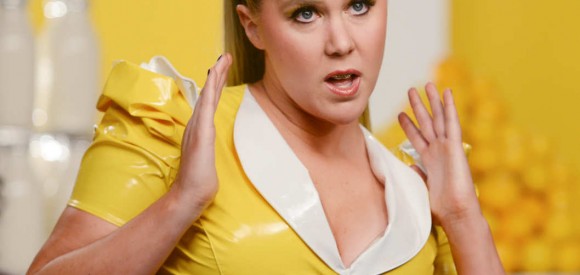Awww shit. We’re finally gonna talk about all the rated R stuff that can happen in improv.
In the first days of Improv 101, it’s often a question hanging in the air: can we say potty words in here? Sometimes it’s not just hanging in the air because a student is so excited to try out all the hilarious curse words and uncomfortable situations they’ve been storing up for their new improv class.

Well, see, the thing is, writing about any of these situations nowin my business newsletter feels really wrong. My gut is telling me not to do it. Why? Because it’s all about context. That’s the short answer I tell my students when they ask me if they can “go blue” as we say in comedy. If the situation demands violence or off color language, by all means, go ahead. But if you’re forcing it in to a scene where it doesn’t belong, skip it. Just for a treat, I’ve included some photos of edgy moments from my shows over the years. You can fill in the blanks with your imagination.
What’s so bad about going blue? I’m a huge fan of Jerry Seinfeld, who famously plays clean and has a great perspective on the topic. “A person who can defend themselves with a gun is just not very interesting. But a person who defends themselves through aikido or tai chi? Very interesting.” Basically, he knows that using bad words and vulgar situations is a cheap shortcut and working without them forces him to play on a higher level.
I’m also a huge fan of Louis CK, who famously does not play clean. He still manages to use the top of his intelligence and cover challenging and interesting topics with all kinds of dirty language. So it can be done well, but it can easily be overused and become a crutch.
Here’s some of my pointers for when to get dirty and when to stay squeaky clean.
WHEN TO GO THERE:

When it serves the character. Cursing is going to come from a dirty cop in an interrogation scene or a mafia boss talking to his underlings. There even might be a lot of it as the characters establish themselves and try to get their point across. It would be strange for them not to. It’s great to play villains and be brave enough to be unlikable. It can make the audience experience emotions of disgust and root for our hero even more.
When it serves the emotion. In that breakup scene when Arturo finds out his girlfriend Marsha has cheated on him, it makes sense for a few key phrases to spill out of his mouth. Cussing is a way of expressing heightened emotion–especially anger and surprise. It’s also can create and interesting contrast when a moment later he’s begging her to not to leave him.
When you have trust, boundaries and rapport with your fellow players. The better you know each other, the further you can go. That’s part of the reason there isn’t a ton of rough language in introductory level improv classes. People don’t know each other and we aren’t sure of everyone’s boundaries and triggers. The safest and most inclusive choice is to work in the PG territory. But when the players are more advanced and cast in a show together, such as the ensemble in Showdown, the Deadwood-inspired dark western series I was in, most scenes contained violence and cursing (of a delicious antique flavor.) And in rehearsal we worked on stage combat, created boundaries for sexual situations, and studied the source material so we were ready to go on show day.

WHEN NOT TO GO THERE:
Because you think it would be funny. Trying to be funny in general is a bad idea in improv. It feels forced and often falls flat. Funny is a great side effect from being in the moment, listening and responding. Relax and let the scene happen. If you really love cursing or want a time to explore a risque situation on stage in front of people, you might want to try it in your stand up act or your one woman show. There’s even a perfect place for that in Austin–No Shame Theater.
Because you are nervous or afraid. It can be a panic response in people who are feeling nervous. Maybe you are trying to get a cheap laugh or protect yourself in some way. Breathe. Relax. It’s not needed. Dare to be boring. Tune back in to your scene partner.
Because you want to make other people afraid/uncomfortable and assert your power. Improv is a team sport and this discomfort comedy isn’t a great choice with people you’re not familiar with. It’s not chivalrous and people will be less likely to join you on stage next time. Remember class 1 is all about being fun to play with and making each other look good. 
Shana Merlin
Founder, Merlin Works

